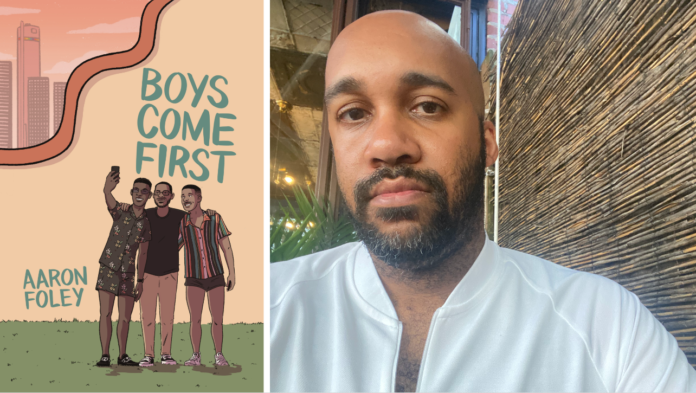
Aaron Foley, a journalist and Detroit native, is taking on fiction in his first novel, “Boys Come First,” a story about the dating scene for gay Black men in Detroit. The book will be published in May 2022.
“There’s a lot of fiction about Detroit, but very few stories have Black characters or Black protagonists,” he tells Pride Source. “Very few take place in modern-day Detroit. Almost none of them have any gay characters. So I wanted to do something about my experiences [and] some of the experiences my gay friends have in Detroit.
Finally showing Twitter the cover of BOYS COME FIRST, a little Detroit story about three BFFs trying to figure out why men are trash, turning 30 is a scam and why suburbanites are suddenly moving to 6 Mile and Livernois – among other things. Coming May 2022 via @belt_publishing. pic.twitter.com/95Go9U76NA
— Aaron Foley (@aaronkfoley) September 7, 2021
Foley’s work has been featured in several Detroit and national publications, including BLAC, This American Life, Jalopnik, The Atlantic, CNN, Next City, Columbia Journalism Review, among others.
Beyond his work as a journalist, he’s written “How to Live in Detroit Without Being a Jackass” and edited a book called “The Detroit Neighborhood Guidebook.”
Foley, who was born in Germany to parents in the military, grew up in Detroit. He considers himself a Detroiter and has lived on both the east and west sides, from Lafayette Park on the lower east side of downtown to Russell Woods to the west.
“I usually claim the west side because that’s where I became of age, learned how to drive, went to high school and made most of the friends that I have now,” he explains.
These days, Foley’s finally living his dream as a fiction writer — a dream that, for Foley, began as kid while writing short stories. “I wanted to do fiction for a long time,” he says, “but I went down the journalism path professionally.”
Along the way, age has changed his perspective, and now Foley wants to talk about “some real stuff” that people like him are going through.
When he and his friends started to ask questions like, “Why is it so hard to date?” and “Why is it so hard as a gay Black man?” Foley began to see the potential for a novel.
“I thought, all right, maybe I should write about this,” he continues. “Some of the stories about our relationships and dating lives are too good to be true. I thought, ‘This is so unbelievable. What if somebody read some of this?’”
According to Foley, Detroit’s dating pool is “so small,” and that since his 2020 move to New York, he hasn’t had the same dating problems.
“In New York, there’s a higher population, [so] you don’t have to worry about dating someone who dated your cousin,” he says, laughing. “In Detroit, you date one person, and later on, you find out they dated your friend. Or they’ve already hooked up with someone you already know. That is the drawback of Detroit. It’s like, if I end up with one dude, and I go to a different party, then his ex is going to be there.”
Foley says his book touches on Detroit’s dating complexities and the city’s revitalization. “I’m just sort of waiting for Detroit to figure itself out,” he admits. “It sounds kind of abstract. [But] there’s a lot of new things coming to Detroit…”
Those new changes are positives for the city, Foley says.
“If a restaurant is great, it brings something necessary to the city, they treat their employees right, and they add value to the neighborhood, [then] I like it,” he says.
Still, Foley worries about Detroit’s cultural preservation.
“I’m concerned about some of the change in terms of what happens when a city continues to lose population,” he says. “[You] see gains in folks that are not from Detroit. So, what does that mean for cultural preservation and controlling the identity that Detroit has had so long?”
He says he ponders these questions often, and in the book, he gives the reader examples of the city’s changing demographic while exploring Detroit’s unique style.
“Like, one of the lead characters, he lives in furs and buffs,” he explains. “Like, that does not exist in Philly or Atlanta or even other big gay cities like West Hollywood.”
Besides learning more about Black men dating in Detroit, Foley hopes people understand that all queer people live nuanced lives.
He says one thing he wants people to get out of this book is that, like everyone else, they are living full lives beyond the narrow perspectives many people have about queer life. It’s simple, really: “These are your neighbors,” Foley says. “These are your co-workers.”








